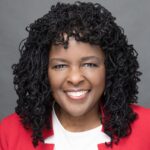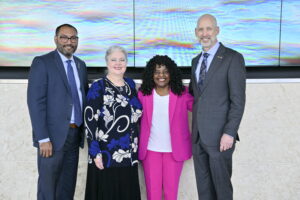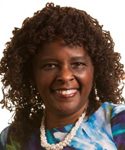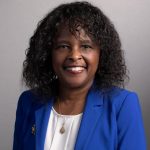
Deborah Dyett Desir, MD
Deborah Dyett Desir, MD, assumes her role as the 87th president of the ACR with great enthusiasm, determination and a lengthy agenda. She is the first Black person to serve as ACR president.
About Dr. Desir
Dr. Desir aspired to be a physician from a young age. She may have been influenced by her father, whom she accompanied on house calls in his role as a family medicine physician, or perhaps she was swayed by watching her younger brother go through several serious health issues in his early years. After graduating from Harvard with a BA in Biochemistry (cum laude), she graduated from Yale School of Medicine (cum laude, Alpha Omega Alpha [AOA] Honor Medical Society).
Although her career path in medicine was generally predetermined, her journey to rheumatology was not without its twists and turns. During her medical school years, she commenced her research in an infectious disease laboratory and completed a prize-winning thesis on white blood cells, which she presented at the annual Student Research Day.
Upon completion of her residency in internal medicine, she began interviewing for fellowships in infectious disease. Well into the interview process, she became increasingly drawn to rheumatology and decided to alter her course. She contacted Stephen Malawista, MD, who was the section chief of rheumatology at Yale at the time and who subsequently served as ACR president in 1991–1992 (b. 1934–d. 2013), to inquire about a rheumatology fellowship. Coincidentally, he remembered her from her thesis presentation at Student Research Day three years earlier and offered her a fellowship in rheumatology a few days later.
Dr. Desir began her career with the goal of becoming a successful academic researcher. During her fellowship, her work was published in top journals in the field and she was awarded a prestigious Robert Wood Johnson Faculty Development Grant, putting her well on her way to achieving her goal. However, she also felt drawn to clinical rheumatology, which ultimately became the focus of her professional career.
Dr. Desir accepted a position as a rheumatologist at a staff-model HMO (health maintenance organization), where she spent seven years. She then opened her own private practice, the Arthritis & Osteoporosis Center P.C., Hamden, Conn. The center thrived, at one point employing four physicians and a nurse practitioner at three locations.
In 2019, Dr. Desir joined the Yale Section of Rheumatology, Allergy & Immunology as a full-time faculty member and medical director of YM Rheumatology Hamden.
Dr. Desir has served as an ACR volunteer in numerous leadership positions throughout her career, including as a member of the nonpartisan political action committee, RheumPAC; a member of the Government Affairs Committee; a member of the Finance Committee; a member of the Committee on Ethics & Conflicts of Interest; a member of the Committee on Rheumatologic Care (CORC); a member of the Committee on Corporate Relations; and as an alternate adviser to the Relative Value Update Committee (RUC).
In addition to her ACR positions, she has held leadership roles with numerous organizations, including serving as president of the New Haven County Medical Association, co-chair of the Connecticut State Medical Society legislative committee, a board member of the Connecticut State Medical Society and a board member of the Cornell Scott Hill Health Center Foundation.
Dr. Desir is delighted to begin her role as president of the ACR. She recently allocated some time to share her perspectives on the priorities and opportunities facing the College in the coming year and beyond, as well as her insights into the benefits and personal satisfaction of volunteering for the ACR.
The President Speaks
The Rheumatologist (TR): You have volunteered for the College for quite some time. Why did you decide to get involved with the ACR and begin volunteering?
Dr. Desir: My involvement with organized medicine began in childhood. My father graduated from medical school in 1954, during a time when African Americans were excluded from many medical organizations. Nevertheless, he became a devoted member of the American Medical Association and the National Medical Association, which was an association for Black physicians. My father often took our family to medical conferences, and we children began to feel like we were members of these organizations as well. This experience instilled in me a strong belief in the importance of organized medicine, and I became very active in county and state medical societies. Participation in organized medicine has become a family tradition; two of my four children are physicians who are also active in their specialty professional organizations.
I owe my initial involvement with the ACR to Joseph Flood, MD, who served as ACR president in 2013–2014 (b. 1952–d. 2023). Dr. Flood visited my office in the early 2000s and encouraged me to become an ACR volunteer, perhaps on the Committee on Rheumatologic Care [because] I ran a rheumatology practice. I was quite interested in volunteering for the ACR, but my passion was advocacy, so I expressed my interest in the Government Affairs Committee (GAC). I have been involved in ACR volunteering and advocacy work ever since.
TR: Your professional life sounds as if it pulls you in many directions. How have you made the time to volunteer?
Dr. Desir: As a private practice owner, I had the autonomy to decide whether to participate on committees and attend meetings. I chose to volunteer for the ACR because I enjoy doing so and value the organization’s incredible work on behalf of patients, rheumatologists and rheumatology professionals. After joining the Yale faculty, I was able to continue volunteering because the Yale Rheumatology Section has a culture of civic engagement, and many faculty members and fellows are active ACR volunteers.
TR: What is one of the accomplishments in your years of ACR service that stands out for you and will help readers understand why you are such a fervent volunteer?
Dr. Desir: I have been particularly pleased with the advocacy work I have done for the ACR. I have come to know both of my state’s senators and all five of Connecticut’s congressional representatives, especially my district representative, Rosa DeLauro, who is a ranking member of the House Appropriations Committee. One of the issues [GAC] worked on was the Pediatric Subspecialty Loan Repayment Program, which had been approved but not funded. When Representative DeLauro was the head of appropriations (during the 117th Congress), I was able to speak with her and explain the importance of this issue.
It has been an absolute pleasure working with our elected officials who care about our patients and our rheumatology professionals. It is important to be at peace with the slow pace of progress in Congress. It can sometimes take a decade or more to achieve results, but with persistence, good things can sometimes get done.
I would also like to mention another aspect of advocacy that I find very gratifying: traveling to Washington [D.C.] with patient groups to advocate for patient issues. It is amazing to see the lightbulb go off when an elected official hears the difficulties patients face in accessing care and truly begins to understand these issues.
TR: The ACR has many initiatives under way. Which ones are you hoping to emphasize during your term as ACR president?
Dr. Desir: One of our ongoing initiatives is addressing the workforce shortage, which is worsening each year. The average age of rheumatologists in the U.S. is over 55, so many retirements are looming. In fact, we forecast a shortage of 4,700 rheumatologists by 2030. This is a significant problem, and we will continue to address it through our workforce initiative.
Diversity, equity and inclusion (DEI) are also important priorities for us. We do not want DEI to be just a separate committee, but rather to integrate it into all aspects of the ACR. In addition to DEI, I would like to add the word ‘belonging’ to this equation. Diversity, equity and inclusion cannot be achieved unless everyone feels the ACR is a place where they can express themselves and be their authentic selves without fear of criticism or condemnation. This means incorporating the issues faced by women in the rheumatology workforce more explicitly.
Currently, 66% of our fellow applicants are women, so we need to ensure that they have access to networking and leadership opportunities, as well as any other resources they need to feel at home in the College.
The same is true for rheumatologists in private practice. We need to make sure they have the resources they need.
Overall, I hope that we can expand the ACR’s culture of belonging this year and in the years to come.
TR: What else do you see as areas that need focus in the coming year and beyond?
Dr. Desir: Ensuring the long-term financial health of the College is one of my top priorities. To achieve this, I believe we must continue to develop partnerships with industry and expand our outreach to various groups within our community. This includes private practice rheumatologists who are facing overwhelming administrative burdens, bench researchers conducting innovative rheumatology research but needing support, and non-rheumatologist physicians who play a vital role in underserved areas. By engaging a wider range of stakeholders, we can build a stronger College.
Access to care is another major concern. There are several barriers to care, such as the maldistribution of rheumatologists, and the high cost of hospitalizations and medications. The affordability of medications is a particularly pressing issue. It is heartbreaking to see patients crying on the exam table because their insurance company has denied coverage for the medication that could relieve their pain and prevent disability. We must advocate for funding for research to support the development of innovative new treatments for patients. We also must ensure that patients have access to these treatments.
As I have mentioned, many issues require our attention. We have a lot of work to do, but I am confident that we can make progress by working together.
TR: Finally, what would you like to share about yourself to help ACR members get to know their new ACR president a bit better?
Dr. Desir: Here are a few things. First, I am a strong believer in community service. One of my favorite quotes is, ‘Service is the rent we pay for the privilege of living on this earth,” by Shirley Chisholm.
Second, I am an award-winning horticulturist. I have nearly 200 houseplants and extensive outdoor gardens, which have been significantly neglected since I joined the ACR Executive Committee!
Third, my husband and I enjoy ballroom dancing, sporting clay shooting and taking long walks on Martha’s Vineyard.
Finally, grandparenting is my greatest joy.
Leslie Mertz, PhD, is a freelance science journalist based in northern Michigan.




